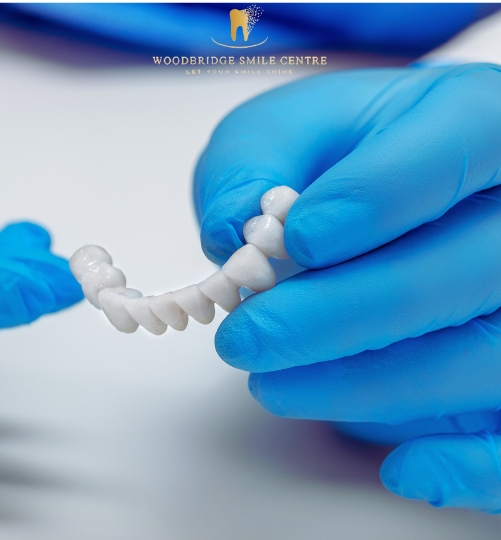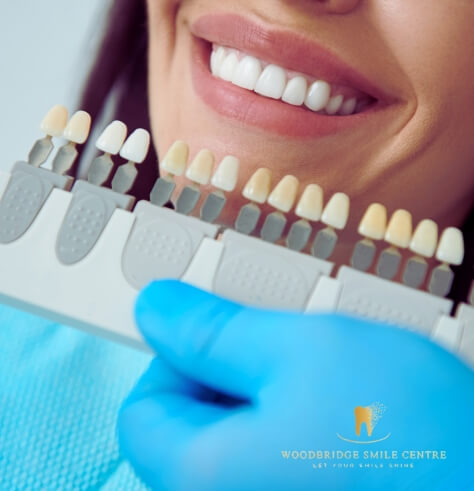Dental Crowns Woodbridge

How to Restore Your Smile with Dental Crowns at Woodbridge Smile Centre
Do you have a damaged, decayed, or discolored tooth that affects your confidence and oral health? If so, you may benefit from getting a dental crown at our modern Woodbridge dental centre.
Dental crowns are custom-made caps that cover the entire visible part of your tooth, restoring their shape, size, strength, bringing back the lost shine to your smile. At Woodbridge Smile Centre, we offer top-quality dental crowns made from various materials, such as metal, porcelain, ceramic, or resin. Our experienced dentists will help you choose the best option for your needs and budget.

What Is a Dental Crown and Why Do I Need One?
A dental crown is a tooth-shaped cap that covers a damaged or decayed tooth to restore its shape, size, strength, and appearance. You may need a dental crown if you have a large cavity, a cracked or broken tooth, a root canal-treated tooth, or a dental implant. A dental crown can also improve the cosmetic appearance of your smile by covering a stained or discolored tooth.
How much does a dental crown cost in Ontario?
The cost of a dental crown in Ontario varies depending on several factors.Some of these factors are:
- The type of material used for the crown, such as metal, porcelain, ceramic, or resin.
- The location and condition of the tooth that needs the crown, such as front or back, decayed or damaged, etc.
- The dentist’s fees, which may differ based on their experience, location, and overhead costs.
Some dental insurance plans may cover part or all of the cost of a crown, depending on your policy and the reason for the crown.
You should check with your insurance provider and your dentist before getting a crown to find out how much you will have to pay out of pocket.
How long does it take to get a dental crown?
Getting a dental crown usually takes two visits to the dentist. On the first visit, your dentist will examine your tooth, take X-rays, and prepare it for the crown. This may involve removing some enamel, reshaping the tooth, and filling any cavities. Your dentist will then take an impression of your tooth and the surrounding teeth, and send it to a dental laboratory where your crown will be made. Your dentist will also place a temporary crown over your tooth to protect it until the permanent crown is ready. On the second visit, your dentist will remove the temporary crown, check the fit and color of the permanent crown, and cement it onto your tooth. Some dental offices may offer same-day crowns using CAD/CAM technology, which allows them to design and mill your crown in the office in one appointment.
LET YOUR SMILE SHINE
How often do I need to replace my dental crown?
The lifespan of a dental crown depends on the type of material, the amount of wear and tear, and your oral hygiene habits. A dental crown can last between five and 15 years, or even longer, with proper care and maintenance. To extend the longevity of your crown, you should:
- -Brush your teeth twice a day, using a soft-bristled toothbrush and a fluoride toothpaste.
- -Floss daily, using a floss threader or a water flosser to clean around the crown and the gum line.
- -Rinse your mouth with an antibacterial mouthwash to prevent plaque and bacteria buildup.
- -Avoid biting on hard or sticky foods, chewing ice, or using your teeth as tools, as these can damage your crown or the underlying tooth.
- -Visit your dentist regularly for check-ups and cleanings, and report any problems or changes with your crown.
You may need to replace your crown if it becomes loose, cracked, chipped, or worn out, or if the tooth underneath develops decay or infection. Your dentist will examine your crown and the surrounding teeth and advise you on the best course of action. Replacing a crown is very similar to the original crown procedure, except that the old crown is removed first.

Will my dental crown look natural and match my other teeth?
Your dental crown will look natural and match your other teeth, as long as you choose the right type of material and shade for your crown. Your dentist will help you select the best option for your tooth, based on your aesthetic preferences and the location of your tooth. For example, if you need a crown for a front tooth, you may want to choose a porcelain or ceramic crown, which can mimic the translucency and color of natural tooth enamel. If you need a crown for a back tooth, you may opt for a metal or PFM crown, which can provide more strength and durability. Your dentist will also match the shade of your crown to your surrounding teeth, using a shade guide or a digital scanner. However, if you plan to whiten your teeth in the future, you may want to do so before getting your crown, as the crown will not change color with bleaching.
Will my dental crown cause any pain or sensitivity?
Your dental crown should not cause any pain or sensitivity, as long as it is placed correctly and securely on your tooth. Your dentist will use local anesthesia to numb your tooth and the surrounding area before preparing your tooth for the crown. You may feel some pressure or discomfort during the procedure, but you should not feel any pain. After the procedure, you may experience some mild soreness or sensitivity in your tooth, gum, or jaw, especially if you had a root canal or an implant. This is normal and should subside within a few days or weeks, as your mouth heals. You can take over-the-counter painkillers, such as ibuprofen or acetaminophen, to relieve any discomfort. You should also avoid hot or cold foods and drinks, and chew on the opposite side of your mouth, until your symptoms improve. If you notice any severe or lasting pain or sensitivity, you should contact your dentist for a check-up.
LET YOUR SMILE SHINE
What are the benefits of getting a dental crown at WoodBridge Smile Centre?
WoodBridge Smile Centre is a dental clinic in Woodbridge, Ontario, that offers comprehensive dental services for all types of patients. The experienced dentists at WoodBridge Smile Centre strive to provide high-quality dental care, personalized solutions, and a comfortable environment for their clients. Some of the benefits of getting a dental crown at WoodBridge Smile Centre are:
- You will receive a thorough consultation and examination to determine the best type of crown for your tooth and your budget.
- You will have access to the latest technology and equipment, such as digital X-rays, intraoral cameras, and CAD/CAM systems, to ensure a precise and minimally invasive procedure.
- You will be treated with respect, compassion, and professionalism by the friendly and knowledgeable staff, who will answer all your questions and address all your concerns.
- You will enjoy a relaxing and pleasant atmosphere, with amenities such as free parking, wheelchair accessibility, and flexible hours.
- You will be able to take advantage of direct insurance billing, payment plans, and special offers, such as a new patient exam, X-rays, and cleaning with a complimentary in-office whitening.
What are some of the other dental services that WoodBridge Smile Centre offers?
WoodBridge Smile Centre offers a wide range of dental services for all your oral health needs, such as:
- General dentistry, including fillings, hygiene services, root canal therapy, extractions, and emergency care.
- Cosmetic dentistry, including teeth whitening, veneers, bonding, and invisible braces.
- Restorative dentistry, including dental implants, bridges, dentures, and full mouth restoration.
- Specialized treatments, including TMJ therapy, sleep apnea treatment, and sedation dentistry.
How can I book an appointment for a dental crown at WoodBridge Smile Centre?
You can book an appointment for a dental crown at WoodBridge Smile Centre by calling (905) 832-3310 or emailing info@woodbridgesmilecentre.com. You can also visit their website at www.woodbridgesmilecentre.com to learn more about their services, staff, and location. WoodBridge Smile Centre is located at 3582 Major Mackenzie Drive W, Unit 6, Woodbridge, ON L4H 3T65678.
Dental Crowns FAQs
Here, you will find the answers to some of the most common questions about dental crowns.
1. What are the different types of dental crowns?
There are various types of dental crowns, such as metal, porcelain-fused-to-metal (PFM), pressed ceramic, and all-porcelain. Each type has its own advantages and disadvantages, depending on factors such as cost, durability, strength, and aesthetics. Your dentist will help you choose the best type of crown for your tooth, based on your personal preferences and oral health needs.
2. Will my dental crown affect my speech or chewing ability?
Your dental crown should not affect your speech or chewing ability, as long as it fits properly and comfortably on your tooth. Your dentist will ensure that your crown has the right size, shape, and alignment, and that it does not interfere with your bite or your adjacent teeth. You may experience some temporary changes in your speech or chewing after getting your crown, as your mouth adjusts to the new restoration. However, these changes should subside within a few days or weeks, as you get used to your crown. If you notice any persistent or severe problems with your speech or chewing, you should contact your dentist for an adjustment.
3. How do I take care of my dental crown and how long will it last?
A dental crown can last between five and 15 years, depending on the type of material, the amount of wear and tear, and your oral hygiene habits. To take care of your dental crown, you should brush your teeth twice a day, floss daily, and visit your dentist regularly for check-ups and cleanings. You should also avoid biting on hard or sticky foods, chewing ice, or using your teeth as tools, as these can damage your crown. If you notice any signs of problems with your crown, such as pain, sensitivity, looseness, or chipping, you should contact your dentist as soon as possible.
